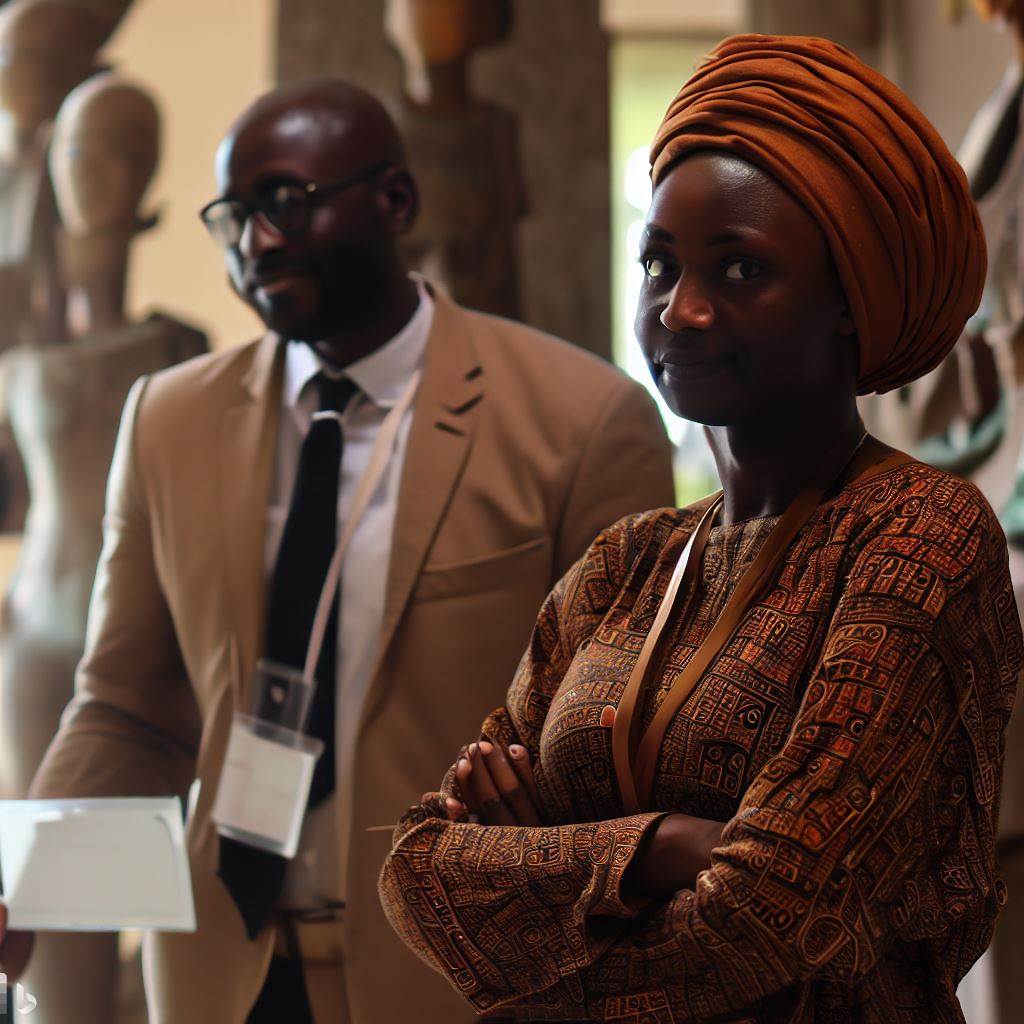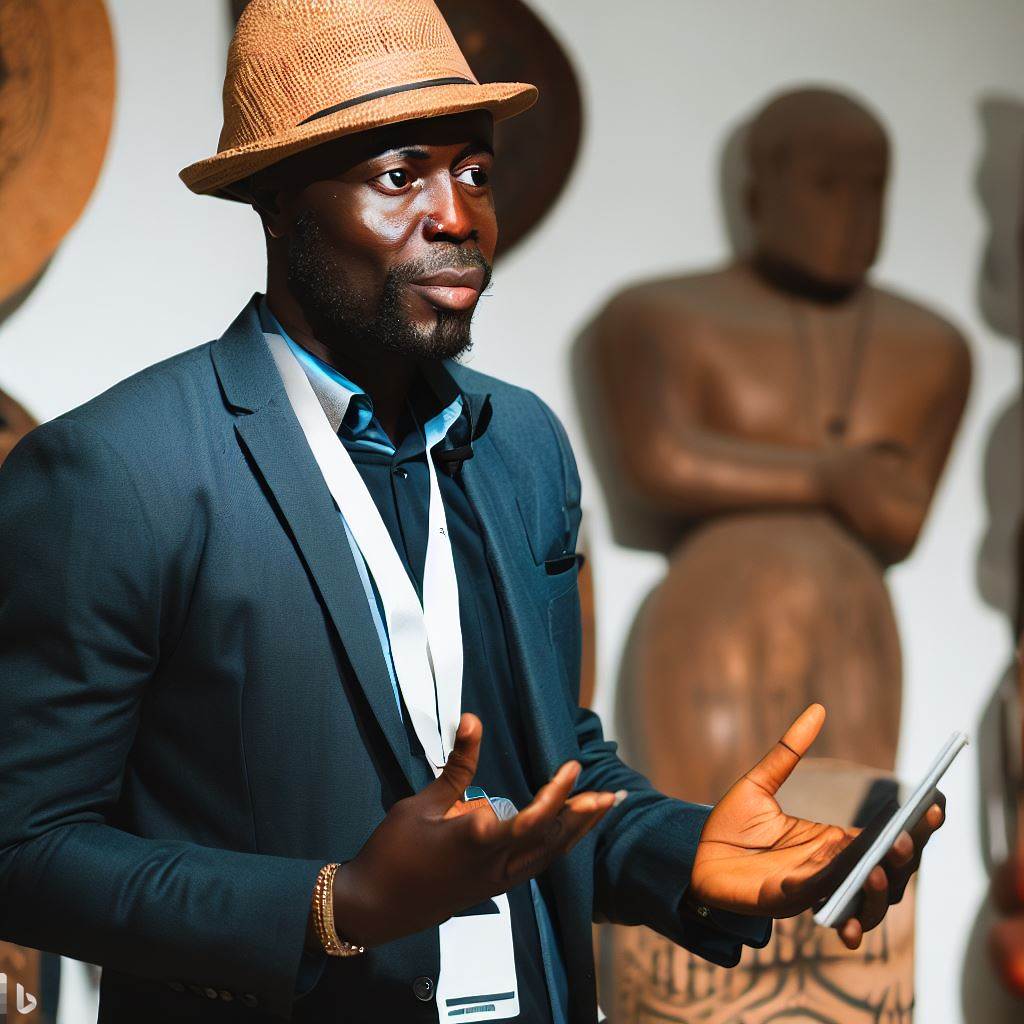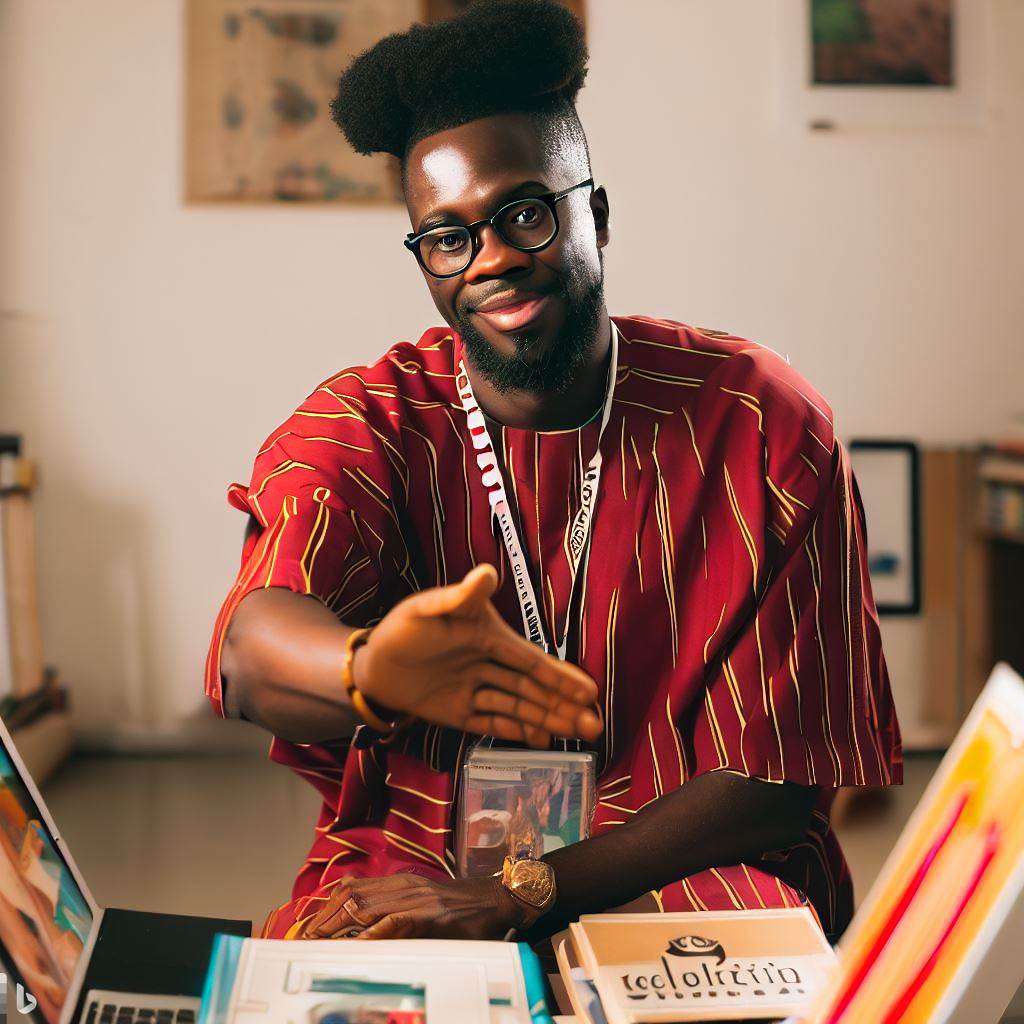Introduction
A. The role and importance of curators in Nigeria
In Nigeria, curators play a vital role in preserving and showcasing the country’s rich cultural heritage.
They are responsible for collecting, organizing, and exhibiting artworks, artifacts, and historical items.
Curators not only contribute to the preservation of Nigeria’s cultural identity, but they also promote tourism and educate the public about the nation’s history.
B. Overview of the blog post’s purpose
This blog post aims to discuss the essential skills required for curators to thrive in Nigeria.
It will explore various aspects of their role, including research, communication, management, and adaptability.
By understanding these skills, aspiring curators can better prepare themselves for a successful career in the field.
Additionally, current curators can enhance their abilities to meet the evolving demands of the industry.
Throughout this post, we will delve into each skill, highlighting its significance and providing practical tips for development.
From conducting in-depth research to effectively communicating with diverse audiences, curators must possess a wide range of capabilities.
Moreover, the post will emphasize the importance of adaptability in a constantly changing landscape.
Curators must be open to new technologies, methodologies, and approaches to meet the expectations of contemporary visitors while staying true to the authenticity of Nigeria’s cultural heritage.
By the end of this blog post, readers will gain a comprehensive understanding of the skills needed to excel as a curator in Nigeria.
Whether aspiring or experienced, individuals interested in this field can utilize this knowledge to make a significant impact and contribute to the preservation and promotion of Nigeria’s cultural treasures.
Basic Knowledge and Expertise in Art
- An understanding of art history is essential for curators to contextualize and interpret artworks.
- Familiarity with different art forms and mediums allows curators to select and showcase diverse works.
- Having knowledge of Nigerian arts and culture is crucial to curate exhibitions that reflect the country’s heritage.
A. Understanding the of art history
Art history serves as the foundation for curators to contextualize and interpret artworks.
By studying the evolution of art throughout history, curators can identify artistic movements, recognize influences, and appreciate the significance of artworks.
This knowledge enables them to connect artworks to their historical and cultural contexts, enhancing the viewing experience for audiences.
Furthermore, curators must be familiar with different art forms and mediums.
From painting and sculpture to installation and video art, the diversity of artistic expressions requires curators to have a broad knowledge of these forms.
This familiarity allows curators to select artworks that represent various styles and techniques, creating a balanced and engaging exhibition.
B. Familiarity with different art forms and mediums
Moreover, a deep understanding of Nigerian arts and culture is crucial for curators in Nigeria.
Nigeria has a rich artistic heritage, with diverse ethnic groups producing unique artworks that reflect their traditions and beliefs.
Curators need to delve into the history, customs, and aesthetics of Nigerian art to curate exhibitions that accurately represent the country’s cultural identity.
This knowledge enables curators to showcase the works of Nigerian artists, celebrate their talent, and preserve the cultural legacy for future generations.
Curators can acquire the necessary knowledge and expertise through formal education in art, such as art history courses and curatorial studies.
Attending workshops, conferences, and art-related events also enables curators to continuously expand their knowledge and stay updated with current trends in the art world.
Engaging with local artists, galleries, and institutions provides firsthand insights into Nigerian arts and culture, facilitating the curation of authentic and meaningful exhibitions.
C. Knowledge of Nigerian arts and culture
Having a strong foundation in art allows curators to excel in their roles.
Nigerian curators, with their grasp of art history, diverse art knowledge, and cultural expertise, can curate inspiring exhibitions that educate and entertain.
This expertise contributes to the growth of the Nigerian art scene and ensures the preservation and appreciation of the country’s artistic heritage.
Research and Analytical Skills
In order to thrive as a curator in Nigeria, it is essential to possess strong research and analytical skills.
These skills enable curators to effectively analyze and interpret artworks, while also identifying trends and themes in the art world.
A. Ability to Conduct Thorough Research on Artists and Artworks
Curators must have the ability to conduct in-depth research on both artists and artworks.
This involves gathering information about the artist’s background, influences, previous works, and artistic style.
By thoroughly researching artists, curators can gain a comprehensive understanding of their artistic journey and the context in which their works were created.
Furthermore, curators must also conduct research on the artworks themselves.
This includes understanding the techniques used, the historical and cultural significance, and the message conveyed by the artwork.
Thorough research allows curators to accurately interpret and contextualize artworks within exhibitions.
B. Proficiency in Critically Analyzing Artworks
An important skill for curators is the ability to critically analyze artworks.
This involves examining the formal elements, such as composition, color, and texture, as well as the conceptual aspects of the artwork.
Curators must develop a keen eye for detail and be able to analyze the aesthetic and intellectual qualities of the artwork.
Additionally, curators must also be able to analyze the historical and cultural context in which the artwork was created.
They must consider the societal, political, and cultural factors that may have influenced the artist’s work.
This analytical approach allows curators to uncover deeper meanings and narratives within the artwork.
C. Capability to Identify Trends and Themes in the Art World
Curators need to be able to identify trends and themes within the art world.
This requires staying up-to-date with the latest developments and understanding the current discourse in the art community.
By identifying trends, curators can create exhibitions that are relevant and engaging to the audience.
They can showcase artworks that address contemporary issues or reflect current artistic movements.
Being aware of themes allows curators to curate cohesive exhibitions that explore specific concepts or narratives.
Furthermore, the ability to identify trends and themes helps curators build connections between different artworks and artists.
They can create exhibitions that highlight similarities or contrasts between different artistic approaches, connecting the dots within the art world.
Possessing strong research and analytical skills is crucial for curators to thrive in Nigeria.
The ability to conduct thorough research, critically analyze artworks, and identify trends and themes allows curators to create meaningful and impactful exhibitions that contribute to the Nigerian art scene.
Exhibition Planning and Curation
A. Skills in organizing and planning art exhibitions
- Efficient time management is essential for organizing and planning successful art exhibitions.
- Strong organizational skills ensure that all aspects of the exhibition, from artwork selection to logistics, are well-coordinated.
- Attention to detail helps in creating a cohesive display and ensuring a smooth flow of the exhibition.
- Effective communication skills are necessary to collaborate with artists, sponsors, and other stakeholders involved in the exhibition.
- Marketing and promotional skills are crucial for creating awareness and attracting a diverse audience to the exhibition.
B. Knowledge of exhibition spaces and logistics
- Curators need a thorough understanding of various exhibition spaces, such as galleries, museums, and outdoor venues.
- Familiarity with the available facilities, equipment, and technological requirements is important for planning and executing exhibitions.
- Knowledge of transportation and shipping logistics is crucial for organizing the safe delivery and installation of artworks.
- Understanding exhibition regulations and legal requirements ensure compliance and a smooth operation of the exhibition.
- Awareness of potential security risks helps curators take necessary precautions to protect valuable artworks.
C. Ability to curate artworks in a visually compelling and cohesive manner
- Curators must possess a strong visual eye and an understanding of artistic concepts to curate artworks effectively.
- The ability to create a narrative or thematic connection among artworks enhances the overall exhibition experience.
- Curators should have a sense of aesthetics to arrange artworks in a visually appealing and engaging manner.
- Attention to lighting, spacing, and placement of artworks contributes to the overall ambiance and impact of the exhibition.
- Knowledge of different art mediums and techniques allows curators to showcase diverse artworks in a cohesive way.
To thrive as a curator in Nigeria, it is crucial to develop the skills needed for exhibition planning and curation.
This includes the ability to organize and plan art exhibitions efficiently, knowledge of exhibition spaces and logistics, and the ability to curate artworks in a visually compelling and cohesive manner.
With these skills, curators can create meaningful and impactful exhibitions that contribute to the Nigerian art scene.
Read: Nigeria’s Customer Service Industry: Key Challenges & Solutions
Networking and Collaboration
Networking and collaboration are crucial skills for a curator in Nigeria to thrive in their profession.
Building connections with artists, galleries, and collectors is essential for success in the art world.
A. Building Connections
- Attend art exhibitions, festivals, and other events to meet artists and build relationships.
- Interact with gallery owners and collectors to expand your network and stay updated on the art scene.
- Use social media platforms to connect with artists, art enthusiasts, and potential collaborators.
B. Collaboration Skills
- Collaborate with other curators to organize joint exhibitions, fostering creativity and diversity.
- Develop strong communication skills to effectively work with artists, stakeholders, and team members.
- Embrace different perspectives and ideas, encouraging interdisciplinary collaborations.
C. Engaging with the Local Art Community
- Attend art workshops, seminars, and conferences to meet and learn from fellow curators and artists.
- Participate in panel discussions and roundtable sessions to share your knowledge and experiences.
- Join art associations, groups, and organizations to connect with like-minded individuals and expand your network.
By actively engaging with the local art community, curators in Nigeria can gain exposure, build credibility, and find opportunities for collaboration and growth.
Read: The Future of Customer Service in Nigeria: A 5-Year View

Marketing and Promotion
- Curators in Nigeria must have a deep understanding of marketing strategies for art exhibitions.
- They should possess skills in utilizing social media platforms for effective promotion of exhibitions.
- A knowledge of effective communication and PR techniques is essential for curators to thrive in Nigeria.
A. Understanding of marketing strategies for art exhibitions
Marketing and promotion play a crucial role in the success of any art exhibition.
Curators in Nigeria need to have a strong understanding of various marketing strategies to attract a wider audience and ensure the success of their curated exhibitions.
B. Skills in utilizing social media platforms for promotion
Utilizing social media platforms is becoming increasingly important in promoting art exhibitions.
With the increasing popularity of platforms like Facebook, Instagram, and Twitter, curators should have the skills to effectively use these platforms to reach a larger and more diverse audience.
They can create engaging content, share exhibition updates, and even interact directly with potential visitors.
This digital promotion allows curators to target specific demographics and engage with art enthusiasts who might not have otherwise heard about the exhibition.
C. Knowledge of effective communication and PR techniques
In addition to social media, curators should employ effective communication and public relations techniques to create a buzz around their exhibitions.
They should be able to write compelling press releases and artist statements, communicate with the media, and engage with the local community.
Developing strong relationships with journalists, bloggers, and influencers can greatly increase the visibility of an exhibition and attract potential visitors.
Curators should also be skilled in networking at art events, maintaining connections with artists, collectors, and other industry professionals.
Curators should be aware of the importance of branding and creating a unique identity for their exhibitions.
A well-designed logo and consistent visual identity can help create recognition and make the exhibition stand out.
Curators should also consider collaborating with other organizations or sponsors to expand their reach and tap into new audiences.
D. Knowledge of effective communication and PR techniques
In an ever-evolving digital landscape, curators should also stay updated on the latest marketing trends and techniques.
They should be familiar with analytics tools to monitor the performance of their promotional efforts and make data-driven decisions.
Understanding the interests and preferences of the target audience can help curators tailor their marketing strategies to effectively communicate the value and significance of the curated exhibition.
Furthermore, curators should organize engaging pre-exhibition events like talks, panel discussions, or workshops to generate hype and build anticipation.
These events not only provide an opportunity for the audience to interact with the curator and artists but also offer a deeper understanding of the exhibition’s themes and concepts.
Creating a sense of exclusivity and excitement can greatly contribute to the success of an exhibition in Nigeria.
Marketing and promotion are essential skills for curators to thrive in Nigeria.
The ability to understand marketing strategies, utilize social media platforms, and employ effective communication and PR techniques can significantly contribute to the success of art exhibitions.
By staying up-to-date with the latest trends and techniques, curators can attract a wider audience and create a lasting impact in Nigeria’s vibrant art scene.
Read: Salary Insights: Customer Service Jobs in Nigeria 2023
Cultural Sensitivity and Ethical Considerations
When it comes to being a curator in Nigeria, cultural sensitivity and ethical considerations are vital aspects to uphold.
Curating involves handling diverse cultural perspectives and requires knowledge of the legal and ethical aspects of the field.
Additionally, curators must demonstrate sensitivity towards cultural appropriation and representation.
A. Respect for diverse cultural perspectives
- Curators must respect and value the unique cultural perspectives present in Nigeria.
- Understanding the different traditions, beliefs, and values is essential to curating effectively.
- Appreciating the diversity within Nigeria’s culture allows curators to showcase a wide range of artistic expressions.
B. Knowledge of the legal and ethical aspects of curating
- Curators need to be well-versed in the legal frameworks that govern curating in Nigeria.
- Understanding copyright laws, intellectual property rights, and exhibition contracts is crucial.
- Complying with ethical guidelines ensures that the rights and interests of artists and communities are protected.
C. Sensitivity towards cultural appropriation and representation
- Curators must be mindful of cultural appropriation – the adoption of elements from a different culture without proper understanding or respect.
- Avoiding the misrepresentation and stereotyping of cultures is important in curatorial practices.
- Engaging with local communities and consulting experts can help ensure accurate cultural representation.
In summary, cultural sensitivity and ethical considerations are crucial for curators in Nigeria.
Upholding respect for diverse cultural perspectives creates opportunities for showcasing the rich artistic heritage present in the country.
Additionally, being knowledgeable about the legal and ethical aspects of curating ensures the fair treatment of artists and the protection of their rights.
Lastly, curators should be sensitive towards cultural appropriation and strive to represent cultures accurately and authentically.
By valuing cultural diversity and adhering to ethical guidelines, curators can contribute to a vibrant and inclusive art scene in Nigeria.
Read: Training for Customer Service Careers in Nigeria: A Guide
Flexibility and Adaptability
In order to thrive as a curator in Nigeria, it is essential to possess flexibility and adaptability skills.
As the art landscape continues to evolve, curators must be able to adapt to changing trends and dynamics in the industry.
A. Ability to adapt to changing art trends and dynamics
Successful curators in Nigeria need to stay updated with the latest art trends and be able to adapt their curatorial approach accordingly.
This involves being aware of emerging artists, new art movements, and evolving tastes of the audience.
B. Willingness to embrace new technologies and digital platforms
With the advancement of technology, curators must embrace digital platforms as a means to showcase and promote art.
Publish Your Professional Profile, Business or Brand
Showcase your expertise, gain trust, and boost visibility instantly on Professions.ng.
Publish NowThis includes using social media, online galleries, and virtual exhibitions to reach a wider audience and create meaningful connections.
C. Openness to experimenting with unconventional art approaches
To stand out as a curator in Nigeria, it is important to be open to experimenting with unconventional and innovative art approaches.
This could involve curating installations, performances, or interactive exhibitions that challenge traditional notions of art.
By being flexible and adaptable, curators can cater to the ever-changing preferences of the Nigerian art scene and contribute to its growth.
Conclusion
Recap of the skills needed to thrive as a curator in Nigeria
To thrive as a curator in Nigeria, several skills are necessary.
These include a deep knowledge of Nigerian art history, excellent interpersonal communication skills, the ability to research and curate relevant exhibitions, and strong leadership abilities.
Additionally, curators should possess creativity, critical thinking skills, and a passion for promoting Nigerian art.
Familiarity with current trends in the art world, as well as the ability to leverage digital platforms for promoting exhibitions, is also essential.
Encouragement for aspiring curators to develop their skills and contribute to the Nigerian art scene.
Aspiring curators in Nigeria should take proactive steps to develop these skills.
They can enroll in art history courses, attend workshops and conferences, and seek mentorship from experienced curators in the field.
Furthermore, aspiring curators should actively engage with the Nigerian art scene by visiting galleries, museums, and art events.
This will not only deepen their understanding of Nigerian art but also provide networking opportunities with artists, collectors, and other industry professionals.
By developing their skills and actively contributing to the Nigerian art scene, aspiring curators can become a vital part of the country’s cultural development.
They have the power to shape the future of Nigerian art by curating impactful exhibitions, promoting emerging artists, and preserving the rich artistic heritage of the nation.
Therefore, while the field of curation in Nigeria may be challenging, it offers immense opportunities for those with the right skills and passion.
With dedication and hard work, aspiring curators can make a significant contribution to the vibrant and dynamic Nigerian art scene.




